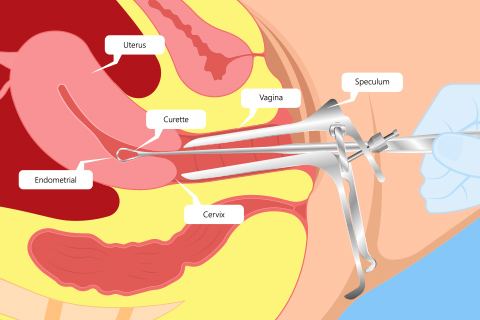Miscarriage
There are few more heartbreaking events that a couple has to deal with than a miscarriage. It leaves many women questioning whether they can have a child or wondering if they did something wrong. For women who already have children, they grieve knowing what they have lost. Please know that there is very little that you (or anyone) can do to either cause or prevent a miscarriage. The doctors and staff at Obstetrics and Gynecology of Atlanta cannot take away your pain but we will answer all of your questions and help explain your choices along the way.

Hormones and lost expectations collide in a messy emotional rollercoaster as you adjust to your new reality. We know this, but unfortunately, you will need to decide about next steps.
Once you have received the news that you have had a miscarriage, you will need to make a decision. Do you use medications and undergo an induced miscarriage or will you elect for a minor surgical procedure called a D&C? Some women prefer to wait for a spontaneous miscarriage although we discourage waiting for more than two weeks.
- With an induced miscarriage you will take medication that will cause your uterus to cramp and your cervix to open so that you can expel the pregnancy tissue. Women choose this option when they want to miscarry in the privacy of their own home. It is successful 90% of the time, however, be prepared for some heavy bleeding, passage of tissue, and significant menstrual cramps. Most women miscarry using these medications in 6 hours or overnight. It does not work in 10% of women and they will need a D&C. After the miscarriage, women usually experience a light period for 2 weeks.
- Women who choose a D&C do so to decrease the uncertainty of “nature taking its course.” A D&C is the most common procedure performed in this country and lasts 10-20 minutes. In this procedure, a woman’s cervix is dilated and the uterus emptied of the pregnancy tissue under anesthesia in an operating room. There is a minor risk from the procedure and from anesthesia.
There is no right choice. Everyone is different and makes decisions based on their comfort level. Differing circumstances may make one option more attractive than another. The appropriateness of each option will be reviewed with you by one of our providers.
Why did this happen?
Women and their partners want to know why they’ve miscarried because they are looking to prevent this from happening in the future. We wish it were that easy. Please know that it is highly unlikely that your miscarriage is related to something you have done. A study that spanned the last 10 years shows that over 80% of miscarriages were caused by random, non-repeatable fetal chromosomal abnormalities. You are not alone. Many women have a combination of abnormal and normal pregnancies. It has been estimated that 15-30% of recognized pregnancies end in miscarriage.
What about your future fertility? Two-thirds of women with a prior loss of a chromosomally abnormal pregnancy go on to have a live birth. Standard workups looking for **other reasons are expensive and fail to identify the cause of recurrent pregnancy losses in more than half of all the cases. 60% of women with two or more recurrent pregnancy losses from either explained or unexplained causes go on to have a healthy term delivery.
**Other reasons: clotting disorders, antiphospholipid syndromes, immunologic problems, uterine malformations and infections, or abnormal parental chromosomes account for a small minority of recurrent pregnancy losses
Let's stay in touch
Our monthly newsletter keeps you up-to-date on healthy lifestyle, latest news, and our practice.





